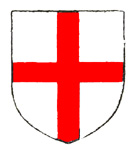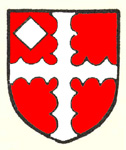The Manor of Leighton Buzzard Alias Grovebury

Coat of arms of Saint George's Chapel, Windsor
The Manor of Leighton Alias Grovebury was granted by John, Second Duke of Suffolk to Saint George's Chapel, Windsor in 1479, who held it until 1863 (with a break between 1649 and 1660 when, under The Commonwealth, deans and chapters were abolished) when it was conveyed to Colonel H.Hanmer. It remained in that family until acquired by J.T.Mills early in the 20th century. In the early 1920s a succession of Law of Property Acts abolished copyhold tenure leaving the Lord of the Manor nothing but an empty title.
The Dean and Chapter leased the manor to Robert Christmas from 1566 to 1576, followed by Francis Barnham and George Barnes, aldermen of the City of London. By 1587 the lessee was Sir Christopher Hoddesden, High Sheriff of Bedfordshire in 1591/2. He was involved in a series of disputes over a right of warren on The Heath in Leighton Buzzard. On his death in 1610 his daughter Ursula, wife of Sir John Leigh became lessee.

Coat of arms of the Leigh family of Stoneleigh
Ursula Leigh's son Thomas was created Lord Leigh in 1643 but, as a prominent Royalist, his estates were farmed out to Parliamentarians in 1644, Leighton alias Grovebury falling to Sir Samuel Luke, of Southill, Scoutmaster General of the Parliamentary army of the Earl of Essex. Lord Leigh sold his useless lease in 1654 to Richard Mead and Colonel John Okey, from Brogborough, commander of the New Model Army dragoons and a signatory to the execution of Charles I. When Okey was executed for treason at the Restoration in 1660 his lease was granted to Charles II's brother James, Duke of York (later James II), who transferred it back to Lord Leigh. The manor continued to be leased by the Leigh family into the 19th century until sold, some time after 1841 to Sir H.Hanmer, who also bought the freehold from Saint George's Chapel. J.T.MIlls was Lord of the Manor in 1918 [UDLLM2/4]. Successive Laws of Property Acts in the 1920s took away all the powers of a Lord of the Manor and abolished copyhold tenure, rendering the title Lord of the Manor nothing more than that, a title.